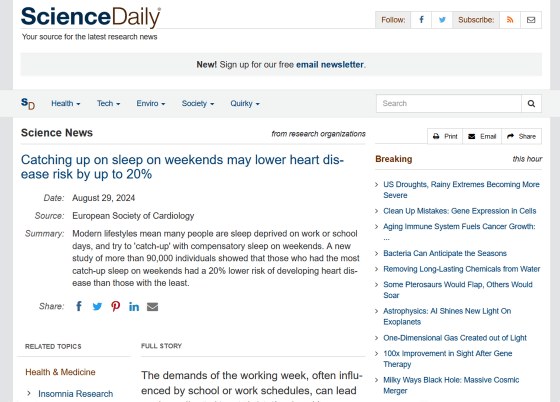Sleeping longer on weekends reduces risk of heart disease by up to 20%

Even if you know it's better to sleep well every day, many people end up sleeping less during busy weekdays and sleeping more on weekends instead. A new study has found that even if you sleep less during the week, sleeping more on weekends can reduce your risk of heart disease by up to 20%.
Catching up on sleep on weekends may lower heart disease risk by up to 20% | ScienceDaily

Catching up on sleep on weekends may lower h | EurekAlert!
https://www.eurekalert.org/news-releases/1055664
Extra Sleep on Weekends Linked to a 20% Lower Heart Disease Risk
https://scitechdaily.com/extra-sleep-on-weekends-linked-to-a-20-lower-heart-disease-risk/
Weekend sleep-ins may benefit heart health, research finds | CNN
https://edition.cnn.com/2024/08/30/health/weekend-sleep-lower-heart-disease-risk-wellness/index.html
People who don't get enough sleep during the week due to school or work schedules often make up for this by sleeping more on weekends, but there hasn't been enough research done on whether this compensatory sleep benefits heart health.
So a Chinese research team conducted a study using data from the UK Biobank , which tracks over 500,000 subjects aged 40 to 69 living in the UK. The study analysed data from 90,903 people who used activity monitoring watches to measure their sleep duration, dividing them into four groups based on the amount of time they spent making up for lost sleep during the week on weekends.
The sleep duration of the four groups on weekends compared to weekdays is as follows:
Group 1 (top 25% of people who had the least amount of compensatory sleep on days off): -16.05 hours to -0.26 hours
Group 2 (26-50% who had less compensatory sleep on days off): -0.26 hours to +0.45 hours
Group 3 (51-75% who had less compensatory sleep on days off): +0.45 hours to +1.28 hours
Group 4 (bottom 25% of people who got less compensatory sleep on days off): +1.28 hours to +16.06 hours
In addition, people who slept less than seven hours a night were defined as sleep deprived, and 19,816 people (21.8%) of the subjects were classified as sleep deprived.

After a median follow-up period of about 14 years, people in 'Group 4,' who engaged in the most compensatory sleep on holidays, had a 19% lower risk of developing cardiovascular disease, such as heart failure, atrial fibrillation, and stroke, compared with people in 'Group 1,' who engaged in the least compensatory sleep.
In addition, an analysis of subjects classified as sleep deprived showed that those in 'group 4' had a 20% lower risk of developing cardiovascular disease compared to those in 'group 1.' No differences were observed between men and women.
At the time of writing, the results of the study have not been published in an academic journal, but were presented at
'Sufficient compensatory sleep is associated with a lower risk of heart disease, and this association is even more pronounced among people who regularly experience sleep deprivation during the weekdays,' said Yanjun Song, a researcher at the National Center for Cardiovascular Disease in China.

◆ Forum is currently open
A forum related to this article has been set up on the official GIGAZINE Discord server . Anyone can post freely, so please feel free to comment! If you do not have a Discord account, please refer to the account creation procedure explanation article to create an account!
• Discord | 'How many hours do you sleep on the weekend?' | GIGAZINE
https://discord.com/channels/1037961069903216680/1285532965769576489
Related Posts:
in Science, Posted by log1h_ik







